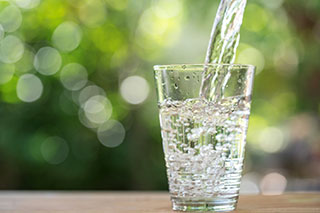 Through the years, dental health importance has only increased in parents who want children to build a foundation of proper dental health practices. While many parents have learned about the dangers of soda and the increase in dental health problems associated with soda, a lot of new drinks have come out onto the market.
Through the years, dental health importance has only increased in parents who want children to build a foundation of proper dental health practices. While many parents have learned about the dangers of soda and the increase in dental health problems associated with soda, a lot of new drinks have come out onto the market.
Among some of the more popular drinks, sparkling water has gained popularity in recent years. Marketed and advertised in many different ways, the seltzer water can present a lot of new questions and concerns around children's dental health. Follow this guide to learn more about sparkling water and what to look for when you give the drink to your child.
Enamel Health & Fluoride Exposure
One of the main concerns with any carbonated beverage is the health and condition of the enamel. The protective layer of enamel in the mouth can wear away when exposed to high levels of acidity or sugar.
In plain unflavored seltzer drinks, the carbonation should not make a big impact on the enamel. However, sparkling drinks with acid added to the ingredients can cause harm to enamel. Look on the labels of seltzer cans and bottles to see if any form of acid was added.
The addition of fluoride to a child's routine also comes with extra enamel protection. Seltzer drinks often come with filtered water. The filters will often eliminate any of the natural fluoride found in tap water.
For children, the fluoride adds extra protection to teeth and can increase the strength of enamel. If children replace regular water often with seltzer water, then they may lose out on the natural exposure to fluoride. As an alternative, you could purchase a fluoride mouth wash to use as a supplement along with the seltzer water so enamel remains strong and protected.
Sugar Additives
Not all sparkling water features just water with carbonation. Many products feature sweeteners that increase the sugar and make the drink more appealing to younger drinkers. While the sugar content may include less sugar than soda, any beverage with sugar is not great for teeth. The liquid sugar can soak over the teeth, go between teeth, and create potential dental issues.
Ideally, you want to avoid sparkling drinks that include any form of sugar. Look for sugar-free options that still add sweetness. For example, some of the drinks may include stevia as a sugar replacement. Stevia does not cause tooth decay in the same way that sugar does and can increase the sweetness if needed.
Ideally, you want to stick with regular seltzer that had nothing else added to ensure optimal oral protection.
Sparkling Water Flavors
Seltzer water comes in a wide variety of flavors that will often appeal to children. While many of the flavors do not cause any potential harm to teeth, you need to be on the lookout for citrus flavored sparkling waters. The citrus flavors will often add more acid to the water and increase potential harm to teeth and enamel.
If you seek out a seltzer water with flavors, then consider a berry flavor like strawberry or raspberry. When your child visits a dentist, the dentist will examine the teeth to look for any signs of enamel wear or signs of inflammation in the gums due to acids.
Even if your child has all their baby teeth, you want to keep their mouth protected and stop the spread of bacteria due to extra exposure to acids in the mouth.
Quick Rinses & Brushing After Meals
If your child already has a habit of drinking seltzer water, then you can establish new habits to help reduce the impact on their oral health. For example, you could have a child rinse their mouth out with regular water after they finish a drink. You could also establish a good habit off brushing their teeth after each meal and beverage.
The rinsing and brushing will help eliminate any harmful exposure on the teeth and ensure their smiles remain healthy. As a child loses teeth and adult teeth grow in, you want to avoid acid and sugar exposure in the deep grooves of the teeth. Eventually, a child could form cavities with increased acid exposure.
Instead of making seltzer water a main drink, consider serving the seltzer only at specific meals like dinner. This way, a child can still enjoy their drink, but not have exposure all day long to excess acids or possible sugars.
Consider the use of straws with any seltzer drink a child has. With the straw placed behind the teeth, you can limit the exposure to the teeth and protect them from extra acid. While the method is not fool-proof, it can help in many ways.
For more information on children's enamel and their dental health, contact us at Dentistry for Children & Adolescents. We offer excellent communication to parents and can answer any questions you have about your child's health. You can ask about specific drink products and get a better understanding of what can damage their teeth and smile.
